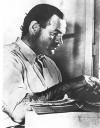U.S. policy toward Cuba is depressing.
Fifty years ago there were high hopes in Cuba when Fidel Castro toppled the dictator Batista and ran out the American Mafia. But since then there has been a slow, steady descent into poverty and repression, the combined effect of the U.S. embargo and Castro’s ruthless system of concentration camps, forced-labor and re-education, supported by a network of secret police and informers. Recently, Castro was replaced by his brother Raul, and there was much speculation about “transition scenarios” and the usual saber-rattling from the administration about regime change, keeping hopes alive for the politically-active Cuban-American community that someday they’ll be able to reclaim the property Castro confiscated fifty years ago.
 But there’s likely no going back in any sense. Consider the curious fate of Ernest Hemingway, always a revered local god in Cuba. His novels To Have and Have Not, The Old Man and the Sea, and Islands in the Stream reflect the sun-soaked, elemental, sometimes violent sense of adventure he found in pre-Castro Cuba. His estate on the edge of Havana, Finca Vigia, or “Look-out Farm,†where he lived for more than two decades, is now a state-run museum, housing thousands of books and dozens of paintings he collected, as well as many heads of animals he killed on safari.
But there’s likely no going back in any sense. Consider the curious fate of Ernest Hemingway, always a revered local god in Cuba. His novels To Have and Have Not, The Old Man and the Sea, and Islands in the Stream reflect the sun-soaked, elemental, sometimes violent sense of adventure he found in pre-Castro Cuba. His estate on the edge of Havana, Finca Vigia, or “Look-out Farm,†where he lived for more than two decades, is now a state-run museum, housing thousands of books and dozens of paintings he collected, as well as many heads of animals he killed on safari.
Finca Vigia is the setting for Leonardo Padua Fuentes’ entertaining novel Adios Hemingway (Cannongate, 2005). As the story opens in the year 2000, ex-cop Mario Conde returns to duty to investigate the discovery of a skeleton and FBI badge that have washed up in the garden during a violent storm. It’s quickly established that the man was murdered some forty years before, during Hemingway’s last months in Cuba. Suspicion falls on the famous author because it was then that he abruptly left Cuba to resettle in Ketchum, Idaho, where he killed himself in 1961.
Biographers often speculate about their subjects’ actions, reconstructing events that are shrouded in mystery or theorizing motivation for an outburst that seems inexplicable. Even novels, such as Colm Toibin’s recent “The Master,†about Henry James, will adhere to biographical detail and yet ask readers to suspend disbelief about the imaginative recreation of inner life. But there’s a wide gulf between spinning a theory and an out-and-out fiction implicating Hemingway in the murder of an FBI agent. It is as if to say that nothing, not even memories of a great man and admired hero, remains the same.
The premise gives the story a certain edge as the steps in Conde’s perfunctory investigation alternate with sections where the ex-cop, a would-be writer himself, imagines Hemingway’s ruminations about his declining years, when the aggressive onset of old age made him question everything. “If he could no longer love, or hunt, or drink, or fight, or almost not write, what was the purpose of living?â€
Much of Hemingway’s public image was tied to these few words, and the deteriorating writer’s fumbling, impressionistic remembrance of the familiar facts of his storied, larger-than-life career, seems honest and poignant. Imagining him capable of murder, even in a fiction, is Conde’s way of projecting a Hemingway chastened and vulnerable in the aftermath. It’s a way of freeing him from “the character he invented for himself.†Conde imagines Hemingway “seeing himself, without an audience, without any disguise, without any lights. He was seeing a man overcome by life.†Again, it’s also a way of trimming the American’s image to size.
The plot is resolved very neatly. Conde and his fellow “Cuban Hemingwayians†are reconciled to their hero’s memory, after all. Even in translation, Fuentes’ prose replicates the taut, nervous energy of Hemingway’s best writing. Except that “Adios Hemingway†seems too short! But then Conde reminds us that the small compass of a Hemingway story is everything, as in his favorite Hemingway tale, “Big Two-Hearted River,†where Nick Adams, a World War I vet, fishes a small trout stream in the “burned-over country†of northern Michigan.
Nick abjures all reflection, focusing on immediate sensation, until the immediate is an overwhelming buzz.
So Nick sits on a rock mid-stream to catch his breath – as we linger mid-story. “He did not want to rush his sensations any.â€